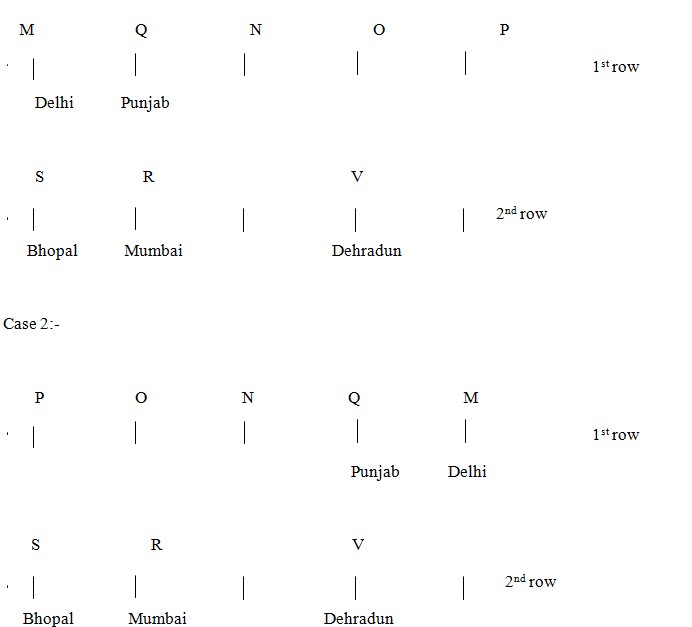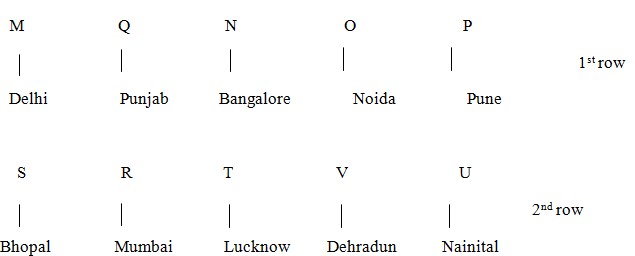Question
N likes who among the following
cities? Study the following information carefully to answer the given questions:- There are ten family members M, N, O, P, Q, R, S, T, U, V. They like different cities i.e. Delhi, Bangalore, Mumbai, Bhopal, lucknow, Dehradun, Nainital, Pune, Punjab and Noida but not necessarily in the same the same order. They are sitting in two parallel rows containing five members each, in such a way that there is an equal distance between adjacent persons. In row 1 – M, N, O, P, Q are seated (not necessarily in the same order) and all of them are facing south. In row 2- R, S, T, U, V are seated (not necessarily in the same order) and all of them are facing north. Members of row 1 are sitting ahead (towards north) of the members of row 2. Therefore in the given seating arrangement each member seated in row 2 faces the back of the other member of row 1. All of them have relation with each other. Only one member sits between O’s sister and M’s brother. Neither N nor U’s grandfather sits just opposite to U. S likes Bhopal and N likes neither Delhi nor Noida. Only two members sit between O’s father and U’s father. U’s husband, who likes Dehradun, sits third to the right of U’s uncle. R sits second to the left of U’s husband. M has two sons and one daughter. Q is the grandmother of R and U. P is the brother – in – law of Q. O is the father of R and brother of N. R’s grandfather, who likes Delhi is not an immediate neighbour of N. The member who sits just opposite to U’s brother, who likes Mumbai, sits immediate left of M’s daughter. V is the husband of U and brother of the one, who likes Lucknow. U likes Nainital and Q likes Punjab. O likes neither Pune nor Bangalore. T likes Lucknow. P does not like BangaloreSolution
Now for sitting arrangement – Only one member sits between O’s sister and M’s brother. Only two members sit between O’s father and U’s father. U’s husband, who likes Dehradun, sits third to the right of U’s uncle. R sits second to the left of U’s husband. The member who sits just opposite to U’s brother, who likes Mumbai, sits immediate left of M’s daughter. R’s grandfather, who likes Delhi, is not an immediate neighbour of N. U likes Nainital and Q likes Punjab. From these conditions there will be two cases: Case 1:-  Now Neither N nor U’s grandfather sits just opposite to U. As there will be no place left for U in case 2. So case 2 will be eliminated. From rest U likes Nainital and Q like PUNJAB. O likes neither Pune nor Bangalore. T likes Lucknow. P does not like Bangalore. So the final solution is –
Now Neither N nor U’s grandfather sits just opposite to U. As there will be no place left for U in case 2. So case 2 will be eliminated. From rest U likes Nainital and Q like PUNJAB. O likes neither Pune nor Bangalore. T likes Lucknow. P does not like Bangalore. So the final solution is – 
Select the most appropriate sequence from the given options to make a meaningful paragraph from jumbled sentences.
A. Mr Adams was very proud o...
Given below are six sentences 4 of which are jumbled. The first and the last sentence are given. Pick the option that gives the logically correct order...
Below are given a few sentences with their parts jumbled in a random order. Below the sentences are given possible rearrangements of the parts. You nee...
A. axe at his feet, spat angrily, and,
B. the woman flung down an
C. her lips, began to scold him
D. it with his axe cautiously
Given below are six sentences 4 of which are jumbled. The first and the last sentence are given. Pick the option that gives the logically correct order...
1. I spend a
P. relaxing by this
Q. couple of hours each
R. lake and helping these
S. Sunday morning,
6.little guys out
Given below are four jumbled sentences. Pick the option that gives their correct order.
A: One day when the quarreling had been much more viol...
A. The officers are looking to reunite the dog with his owner.
B. Eventually, the police caught the Chihuahua.
C. A police officer on a mo...
Each question is divided into four parts a,b,c,d. In some questions they are not in the sequence so according to grammar and context re- arrangement is...
1. I mean,
P. turtles living in lakes
Q. efforts are kind
R. and all, but there are fresh water
S. I think your
6.all around the world.
Relevant for Exams:



